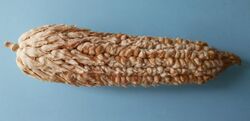Biology:Pod corn
From HandWiki
Short description: Variety of maize
| Pod corn | |
|---|---|
 | |
| Species | Zea mays |
| Variety | Zea mays var. tunicata |
Pod corn or wild maize is a variety of maize (corn).[1][2] It is not a wild ancestor of maize but rather a mutant that forms leaves around each kernel.[3]
Pod corn (tunicata Sturt) is not grown commercially, but it is preserved in some localities.[4]
Pod corn forms glumes around each kernel which is caused by a mutation at the Tunicate locus. Because of its bizarre appearance, pod corn has had a religious significance to certain Native American tribes.[5]
The six major types of corn are dent corn, flint corn, pod corn, popcorn, flour corn, and sweet corn.[6]
References
- ↑ Maize Cobs and Cultures: History of Zea mays L.. Springer. 2010. pp. 114–. ISBN 978-3-642-04524-0. https://books.google.com/books?id=pHChoyH4FMwC&pg=PA114. Retrieved 20 April 2013.
- ↑ Han, JJ; Jackson, D; Martienssen, R (2012). "Pod corn is caused by rearrangement at the Tunicate1 locus". The Plant Cell 24 (7): 2733–44. doi:10.1105/tpc.112.100537. PMID 22829149.
- ↑ "Pod corn develops leaves in the inflorescences -- ScienceDaily". https://www.sciencedaily.com/releases/2012/04/120424120541.htm.
- ↑ Willy H. Verheye, ed (2010). "Growth And Production Of Maize: Traditional Low-Input Cultivation". Soils, Plant Growth and Crop Production Volume II. EOLSS Publishers. p. 77. ISBN 978-1-84826-368-0. https://www.eolss.net/ebooklib/bookinfo/soils-plant-growth-crop-production.aspx.
- ↑ Wingen, L. U., Munster, T., Faigl, W., Deleu, W., Sommer, H., Saedler, H., & Theissen, G. (2012). Molecular genetic basis of pod corn (Tunicate maize). Proceedings of the National Academy of Sciences, 109(18), 7115-7120. doi:10.1073/pnas.1111670109
- ↑ Linda Campbell Franklin, "Corn," in Andrew F. Smith (ed.), The Oxford Encyclopedia of Food and Drink in America. 2nd ed. Oxford: Oxford University Press, 2013 (pp. 551–558), p. 553.
 |

